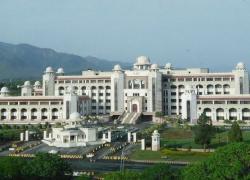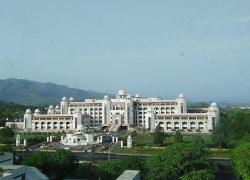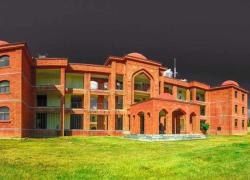Ghulam Ishaq Khan Institute of Engineering Sciences and Technology, Khyber Pakhtunkhwa
The Ghulam Ishaq Khan Institute of Engineering Sciences and Technology (GIKI), located in Topi, Khyber Pakhtunkhwa, Pakistan, is one of the country’s premier institutions for engineering and technology education. Established in 1993, GIKI has earned a reputation for its rigorous academic programs, cutting-edge research, and strong emphasis on innovation and entrepreneurship. Named after Ghulam Ishaq Khan, a prominent Pakistani statesman and former President of Pakistan, the institute aims to produce highly skilled engineers and technologists capable of contributing to national and global advancements.
Historical Background
The foundation of GIKI was laid by the Ghulam Ishaq Khan Institute of Engineering Sciences and Technology Trust, which was established with the vision of creating a world-class institution dedicated to engineering and technology. The idea was spearheaded by Mr. Ghulam Ishaq Khan, who recognized the critical need for advanced technical education to drive Pakistan’s economic and industrial growth. With support from leading industrialists and policymakers, GIKI was inaugurated on 21 August 1993.
From its inception, GIKI has been committed to providing an education that meets international standards. The institute was established with the support of the Society for the Promotion of Engineering Sciences and Technology in Pakistan (SOPREST), which played a crucial role in its development. Over the years, GIKI has expanded its academic programs, research initiatives, and infrastructure, maintaining its position as a leader in engineering education in Pakistan.
Campus and Facilities
GIKI is located in the serene and picturesque area of Topi in the Swabi District of Khyber Pakhtunkhwa. The campus is spread over 400 acres and provides a tranquil environment conducive to learning and research. The institute’s architecture blends modern design with natural beauty, creating a vibrant and inspiring atmosphere for students and faculty.
One of the distinguishing features of GIKI is its state-of-the-art facilities. The campus houses modern lecture halls, well-equipped laboratories, and research centers that support a wide range of engineering disciplines. These facilities are essential for fostering a hands-on learning experience and enabling students to engage in practical applications of their theoretical knowledge.
The GIKI Central Library is a cornerstone of the campus, offering an extensive collection of books, journals, and digital resources. The library provides access to a wealth of academic and research materials, supporting the educational and scholarly activities of students and faculty. With advanced technology and comfortable study spaces, the library serves as a hub for academic collaboration and intellectual exploration.
In addition to academic facilities, GIKI provides comprehensive residential facilities for students. The on-campus hostels are designed to offer a comfortable and secure living environment, promoting a sense of community and facilitating academic interaction. The campus also includes recreational facilities, such as sports complexes, fitness centers, and student clubs, ensuring a well-rounded educational experience.
Academic Programs
GIKI offers a diverse range of academic programs that cater to the evolving needs of the engineering and technology sectors. The institute provides undergraduate, graduate, and postgraduate degrees in various engineering disciplines, ensuring that students receive a comprehensive and interdisciplinary education.
At the undergraduate level, GIKI offers Bachelor of Science (B.Sc.) degrees in disciplines such as Mechanical Engineering, Electrical Engineering, Computer Engineering, Chemical Engineering, Materials Engineering, and Civil Engineering. These programs are designed to provide students with a strong foundation in engineering principles, combined with practical skills and hands-on experience. The curriculum is regularly updated to reflect the latest advancements in technology and industry trends.
For graduate and postgraduate students, GIKI offers Master of Science (M.Sc.) and Doctor of Philosophy (Ph.D.) programs that emphasize advanced research and specialized knowledge. These programs aim to develop experts and researchers who can contribute to the advancement of engineering and technology. The graduate programs are characterized by a strong emphasis on interdisciplinary research, innovation, and collaboration, promoting a culture of academic excellence and intellectual curiosity.
Areas of Specialization Offered:
The different areas of specialization offered in the respective faculties include:
1.Faculty of Computer Sciences & Engineering (FCSE)
- Artificial Intelligence and Robotics
- Algorithms and Computational Theory
- High Performance Computing
- Machine Learning & Data Mining
- Network Communications and
- Distributed Systems
- Signal and Image Processing
- Software and Systems Engineering
- Data Science & Data Mining
- Data Warehousing
- Data Visualization
2.Faculty of Engineering Sciences (FES)
- Semiconductor and Microelectronics
- Photonics
- Modeling and Simulation
3.Faculty of Electrical Engineering (FEE)
- Communication Systems and Digital Signal Processing
- Microelectronics & ASIC Design
- Electric Power
- Control Systems
4.Faculty of Mechanical Engineering (FME)
- Design and Manufacturing Engineering
- Thermo-Fluid Engineering
- System Dynamics and Controls
5.Faculty of Material Science and Chemical Engineering (FMCE)
a. Department of Materials Science and Engineering (DMSE)
- Materials Processing, Manufacturing and Characterization
- Surface Engineering and Coating Technology
- Nanotechnology and Nanomaterials
- Advanced Materials
- Ceramics, Polymers and Composites
- Biomaterials
- Corrosion and Degradation
b. Department of Chemical Engineering (DChE)
- Process and Equipment Design
- Fluid Handling and Thermodynamic behavior
- Reaction Kinetics and Catalysis
- Transport Processes
7. Department of Civil Engineering (DCvE)
- Water Resources Engineering
- Geotechnical Engineering
- Transportation Engineering
- Structural Engineering
- Environmental Engineering
- Construction Engineering
8. School of Management Sciences (SMgS)
- Supply Chain Management
- Accounting and Finance
- Entrepreneurship and Marketing
Research and Innovation
Research and innovation are at the core of GIKI’s mission. The institute is dedicated to fostering a research-oriented environment that encourages faculty members and students to engage in cutting-edge research and technological innovation. GIKI has established several research centers and institutes that focus on various areas of engineering and technology, promoting interdisciplinary research and collaboration.
One of the notable research centers at GIKI is the Center for Advanced Studies in Engineering (CASE). This center is recognized for its contributions to the field of engineering and technology and has garnered international acclaim for its research output. CASE serves as a platform for researchers to collaborate on projects that address critical scientific and technological challenges, contributing to the advancement of knowledge and innovation.
In addition to specialized research centers, GIKI actively promotes research through funding opportunities, grants, and partnerships with national and international institutions. The institute has established collaborations with leading universities and research organizations worldwide, facilitating academic exchanges and joint research projects. These collaborations enhance GIKI's research capabilities and provide students and faculty members with opportunities to engage in global research initiatives.
Industry Linkages and Practical Training
A distinctive feature of GIKI is its strong linkages with industry. The institute places a high priority on bridging the gap between academia and industry, ensuring that students are well-prepared for the demands of the job market. This is achieved through a range of initiatives, including industrial internships, collaborative projects, and industry-driven research.
GIKI's partnerships with leading companies and organizations provide students with opportunities for practical training and hands-on experience. These internships and training programs are integral to the curriculum, allowing students to apply their knowledge in real-world settings and gain valuable insights into industry practices. This practical exposure is crucial for developing the skills and competencies required for successful careers in engineering and technology.
In addition to internships, GIKI encourages students to engage in collaborative projects with industry partners. These projects often address real-world challenges and provide students with the opportunity to work on innovative solutions. The institute's emphasis on industry collaboration ensures that the education provided is relevant and responsive to the needs of the job market.
Innovation and Entrepreneurship
GIKI places a strong emphasis on innovation and entrepreneurship, recognizing the critical role they play in driving economic growth and societal progress. The institute has established the GIKI Incubation Center, which provides support and resources for aspiring entrepreneurs. The center offers mentorship, funding, and networking opportunities, enabling students and alumni to turn their innovative ideas into successful startups.
The emphasis on entrepreneurship is integrated into the academic curriculum, with courses and programs designed to develop entrepreneurial skills and mindsets. GIKI encourages students to engage in entrepreneurial activities, participate in competitions, and collaborate with industry partners to develop innovative solutions to real-world challenges.
Extracurricular Activities and Student Life
GIKI offers a vibrant campus life that extends beyond academics. The institute provides a wide range of extracurricular activities and student organizations that cater to diverse interests and talents. These activities play a crucial role in fostering a sense of community, developing leadership skills, and promoting personal growth.
Sports are an integral part of campus life at GIKI, with excellent facilities for cricket, football, tennis, and indoor sports. The institute regularly organizes intercollegiate and inter-university sports events, promoting a spirit of healthy competition and teamwork among students.
Cultural and literary societies are also prominent at GIKI. These societies organize events, seminars, and workshops that celebrate the rich cultural heritage of the region and provide a platform for students to showcase their artistic and literary talents. The institute's annual cultural festival is a highlight, featuring performances, exhibitions, and competitions that bring the campus community together.
Student organizations and clubs play a vital role in fostering leadership skills and community engagement. These organizations cover a wide range of interests, from academic and professional associations to social and environmental clubs. They provide students with opportunities to develop their leadership abilities, network with peers, and contribute to meaningful causes.
Community Engagement and Outreach
GIKI is deeply committed to serving the community and addressing societal challenges through its outreach initiatives. The institute actively engages with local communities, government agencies, and non-governmental organizations to address pressing social, economic, and environmental issues.
One of the key outreach programs of GIKI is its community development initiatives. These initiatives focus on improving the quality of life for marginalized and underprivileged communities in the region. The institute conducts workshops, training programs, and awareness campaigns on topics such as health, education, and sustainable development. Through these efforts, GIKI aims to empower communities and promote social equity.
In addition to community development, GIKI is involved in disaster management and relief efforts. Given its strategic location in a region prone to natural disasters, the institute has developed expertise in disaster preparedness and response. GIKI collaborates with national and international agencies to provide training and support for disaster management, contributing to the resilience of local communities.
Challenges and Future Prospects
While GIKI has made significant strides in education, research, and community engagement, it faces several challenges that require strategic planning and concerted efforts. One of the primary challenges is ensuring financial sustainability and securing adequate funding for academic and research programs. The institute relies on government funding, grants, and donations, and there is a need to diversify funding sources to support its growth and development.
Another challenge is maintaining academic standards and quality assurance. As GIKI expands its academic programs and student enrollment, it must ensure that the quality of education is not compromised. This requires continuous evaluation and improvement of curricula, teaching methodologies, and faculty development programs.
Despite these challenges, GIKI is poised for a promising future. The institute's strategic vision focuses on enhancing academic excellence, fostering research and innovation, and strengthening industry linkages. GIKI aims to leverage technology and digitalization to improve access to education and research resources. The institute also plans to expand its international collaborations and partnerships, positioning itself as a leading institution of engineering and technology in the region and beyond.
Conclusion
The Ghulam Ishaq Khan Institute of Engineering Sciences and Technology holds a distinguished place in Pakistan's educational landscape. With its rich history, diverse academic programs, commitment to research, and vibrant campus life, GIKI continues to inspire and nurture future leaders, scholars, and professionals. As it moves forward, the institute remains dedicated to its mission of academic excellence, innovation, and community service, contributing to the socio-economic development of the region and the country.










